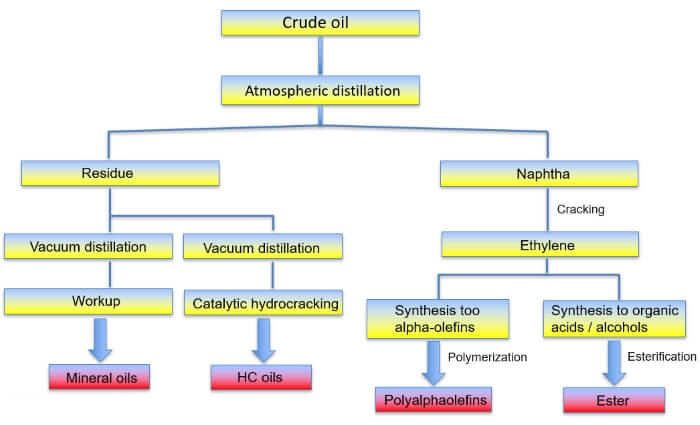


What is HC synthetic oil?
The term HC synthetic oil refers to a base oil of a lubricant which is refined by the production process of hydrocracking. HC stands for Hydrocracking. HC synthetic oil is a highly refined mineral oil with a high purity level. The HC synthetic oils belong to the Group II and Group III base oils, which have been classified by API. The purity of HC synthetic oils is expressed by more than 90% saturated hydrocarbon compounds and a sulphur content of ≤ 0.03%. The HC synthetic oils are therefore significantly more efficient and more stable to ageing than group I lubricants. Group II base oils are obtained by mild hydrocracking processes and are in turn less efficient than Group III base oils which are based on strong hydrocracking.

How does hydrocracking work?
The refinery process requires either crude paraffin or vacuum gas oil as feedstock. Initially, temperatures around 400 °C and a pressure of 13-17 MPa are generated in the hydrocracker. The addition of larger quantities of hydrogen is also necessary. This catalytically cracks long-chain hydrocarbon compounds and converts them into intermediates for the production of gasoline, diesel or lubricating oil. Base oils in various viscosities can be obtained from this. The base oils are very pure, largely olefin-free and contain only small amounts of sulphur or nitrogen.

What is the difference between HC synthetic oil and fully synthetic oil?
HC synthetic oil is mineral oil which is best cleaned and upgraded by hydrocracking. However, the quality of HC synthetic oil is always determined by the crude oil. There is no way to go beyond the physical limits of the product. By strong hydrocracking a viscosity index (determines the viscosity-temperature behaviour of the oil) of 120-140 can be achieved.
Fully synthetic oils must consist of at least 80% base oils of group IV or group V. These are suitably synthesized lubricants, which are composed of short-chain hydrocarbon compounds and have been optimized in terms of their technical properties. Fully synthetic oils can achieve a viscosity index of 135-190. This makes the fully synthetic oils even more efficient and temperature stable than HC synthetic oils.
Contact
